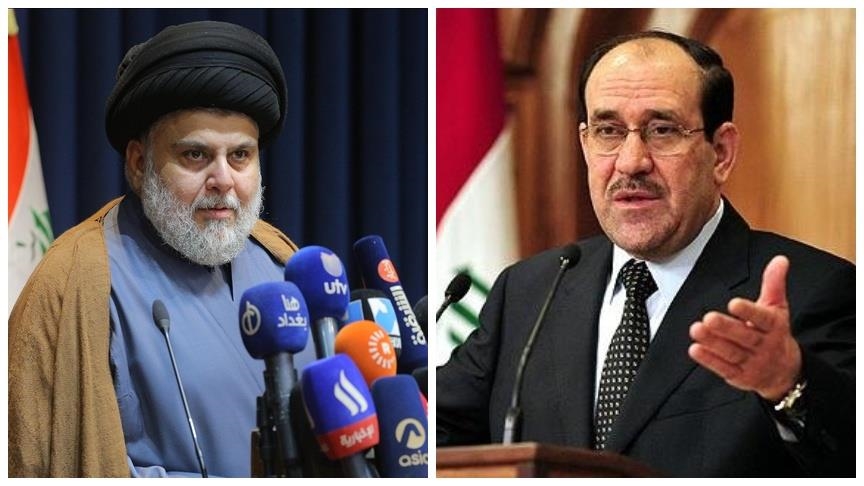Traditional intra-group rivalry impeding new government formation in Iraq
Shia cleric al-Sadr sees exclusion of ex-premier al-Maliki as key to reaching agreement on forming new government

ANKARA
The formation of a new government in Iraq has been elusive as long-running tensions continue to ramp up between prominent Shia leaders, cleric Muqtada al-Sadr and former Prime Minister Nouri al-Maliki, who have been known as traditional rivals since 2008.
Iraqi people are in dire need of a new government to improve their poor living conditions following years of security crisis caused by Daesh/ISIS, which caused mass internal displacements. The terrorist group still has sleeper cells in the war-torn country, despite authorities declaring the defeat of the group in 2017.
The country has also witnessed an exacerbating economic crisis as a result of political powers' failure to achieve reform, while Iraq has become one of the world's most corrupted countries in recent years, with corruption and security tensions undermining the country's institutions, according to the Berlin-based Transparency International index.
Political deadlock
In the latest developments in the formation of a new government, supporters of al-Sadr, who leads the Sadrist Movement, stormed the fortified Green Zone in Baghdad late Wednesday, including the parliament, in protest of the nomination of a new premier by Shia parties close to Iran, of which al-Maliki is a leading political figure.
Although al-Sadr’s movement won the last year’s general elections, forming a new coalition government has been stymied by differences between the prominent Shia cleric and al-Maliki.
Al-Sadr has voiced his intention to establish a national majority Cabinet far removed from narrow sectarian biases, as well as to exclude some forces from it, including the State of Law coalition led by al-Maliki.
The Shia forces under the umbrella of the Coordination Framework – known for close ties with Iran - demand a consensual government in which all political forces in the parliament participate, similar to previous sessions. Due to the failure to reach an agreement with the Coordination Framework, al-Sadr asked lawmakers from his bloc in June to resign and once again he took the helm of the opposition.
On Monday, Mohammed al-Sudani, 52, was selected by the Coordination Framework as a candidate for the country’s premiership. However, al-Sadr reacted by announcing that he will not accept al-Sudani to form a new government before his supporters stormed the Green Zone on Wednesday.
The firebrand cleric is well-known for his great influence on Iraqi streets, as mass protests initiated by his supporters in the summer of 2019 forced former Prime Minister Adel Abdul Mahdi to eventually resign.
Shia rift
Disagreements and hostility between al-Sadr and al-Maliki have been stretched back to the years of American occupation in Iraq when then-Prime Minister al-Maliki led a US-backed military campaign to enforce the law in Basra and other southern provinces in 2008.
This campaign targeted the Mahdi Army, the armed wing of the Sadrist movement, which was later forced to cede its weapons and headquarters and leave Basra, where it had extensive control over security and economic files.
Maliki’s move effectively ended the Mahdi Army's influence in southern Iraq and prompted al-Sadr to disband the armed group in April 2008.
The two figures' rivalry has become a part of the Iraqi political landscape. It became rampant and took a toll on forming the next government, manifesting when al-Sadr in mid-June called on al-Maliki to either quit politics or surrender to the judiciary following leaked audio attributed to him.
According to the audio leaks attributed to al-Maliki, at a meeting, he referred to Shia cleric al-Sadr as a "murderer" and "thief."
The recordings also include a claimed attack by al-Maliki on the city of Najaf, where al-Sadr is located, and alleged participation in a conspiracy with one of the Iranian Shia leaders to orchestrate a fight within the Shia sect by threatening to arm between 10 and 15 groups to storm the city.
On Tuesday, the Iraqi judiciary said investigations into the leaked tapes will begin.
Elusive government
Political analysts have noted that the audio leaks have virtually eliminated the possibility of al-Maliki and his party forming the next government, a move perceived as favoring al-Sadr.
Nevertheless, the current prime minister candidate al-Sudani is expected to face hurdles due to al-Sadr's refusal to endorse him, which has complicated the existing political situation.
The Cabinet’s outline is expected to be shared among all political powers, leaving it vulnerable to becoming a fragile coalition government and raising concerns about its functionality.
The Iraqi Parliament is scheduled to meet in the coming days to elect a new president, which is required before a new prime minister can be appointed.
While al-Sudani's nomination is expected to be approved by parliament after the withdrawal of al-Sadr’s parliamentary bloc from the assembly, the Kurdish parties still have to reach an agreement on a new presidential candidate.
Iraq’s to-be-elected president will appoint the new prime minister to form the government. The prime minister is obliged to present his Cabinet lineup to the Parliament within 30 days.
In 2004, Paul Bremer, the head of the Coalition Provisional Authority (post-invasion US-led interim government), instituted a quota system.
The system is ostensibly designed to ensure fair representation, with the position of president reserved for a Kurd, prime minister reserved for a Shia Muslim, and Parliament Speaker reserved for a Sunni Muslim.





